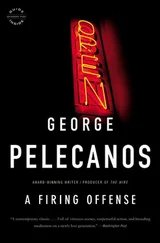Sally’s secret was that she didn’t actually hear a word that her admirers said, just nodded and laughed at the right moments, cued by their inflections as to how to react. Meanwhile, deep inside her head, she was mapping out the logistics of her next day. Just a soccer mom, indeed. To be a stay-at-home mother in Northwest D.C. was to be nothing less than a general, the Patton of the car pool, the Eisenhower of the HOV lane. Sally spent most of her afternoons behind the wheel of a Porsche SUV, moving her children and other people’s children from school to lessons, from lessons to games, from games to home. She was ruthlessly efficient with her time and motion, her radio always tuned to WTOP to catch the traffic on the eights, her brain filled with alternative routes and illegal shortcuts, her gaze at the ready to thaw the nastiest traffic cop. She could envision her section of the city in a three-dimensional grid in her head, her house on Morrison and the Dutton School off Nebraska the two fixed stars in her universe. Given all she had to do, you really couldn’t blame her for not listening to the men who bent her ear, a figure of speech that struck her as particularly apt. If she allowed all those words into her head, her ears would be bent — as crimped, tattered, and chewed-up looking as the old tom cat she had owned as a child, a cat who could not avoid brawls even after he was neutered.
But when Peter came to her in the seventeenth year of their marriage and said he wanted out, she heard him loud and clear. And when his lawyer said their house, mortgaged for a mere $400,000, was now worth $1.8 million, which meant she needed $700,000 to buy Peter’s equity stake, she heard that, too. For as much time as she spent behind the wheel of her car, Sally was her house, her house was Sally. The 1920s stucco two-story was tasteful and individual, with a kind of perfection that a decorator could never have achieved. She was determined to keep the house at all costs and when her lawyer proposed a way it could be done, without sacrificing anything in child support or her share of Peter’s retirement funds, she had approved it instantly and then, as was her habit, glazed over as the details were explained.
“What do you mean, I owe a million dollars on the house?” she asked her accountant, Kenny, three years later.
“You refinanced your house with an interest-only balloon mortgage in order to have the cash to buy Peter out of his share. Now it’s come due.”
“But I don’t have a million dollars,” Sally said, as if Kenny didn’t know this fact better than anyone. It was April, he had her tax return in front of him.
“No biggie. You get a new mortgage. Unfortunately, your timing sucks. Interest rates are up. Your monthly payment is going to be a lot bigger — just as the alimony is ending. Another bit of bad timing.”
Kenny relayed all this information with zero emotion. After all, it didn’t affect his bottom line. It occurred to Sally that an accountant should have a much more serious name. What was she doing, trusting someone named Kenny with her money?
“What about the equity I’ve built up in the past three years?”
“It was an interest-only loan, Sally. There is no additional equity.” Kenny, a square-jawed man who bore a regrettable resemblance to Frankenstein, sighed. “Your lawyer did you no favors, steering you into this deal. Did you know the mortgage broker he referred you to was his brother-in-law? And that your lawyer is a partner in the title company? He even stuck you with P.M.I.”
Sally was beginning to feel as if they were discussing sexually transmitted diseases instead of basic financial transactions
“I thought I got an adjustable-rate mortgage. A.R.M.’s have conversion rates, don’t they? And caps? What does any of this have to do with P.M.I.?”
“A.R.M.’s do. But you got a balloon, and balloons come due. All at once, in a big lump. Hence the name. You had a three-year grace period, in which you had an artificially low rate of less than three percent, with Peter’s four thousand in rehabilitative alimony giving you a big cushion. Now it’s over. In today’s market, I recommend a thirty-year fixed, but even that’s not the deal it was two years ago. According to today’s rates, the best you can do is—”
Frankennystein used an old-fashioned adding machine, the kind with a paper roll, an affectation Sally had once found charming. He punched the keys and the paper churned out, delivering its noisy verdict.
“A million financed at a thirty-year fixed rate — you’re looking at almost $6,000 a month and that’s just the loan. No taxes, no insurance.”
It was an increase of almost $2,000 a month over what she had been paying for the last three years, not taking into account the alimony she was about to lose, which came to $4,000 a month. A net loss of $6,000.
“I can’t cover that, not with just $5,000 a month in child support.” Did Kenny raise a caterpillar eyebrow at the “just.” Sally knew that Peter paid well, but then — he earned well. “I can’t make a mortgage payment of that size and pay my share of the private school tuition, which we split fifty-fifty.”
“You could sell. But after closing costs and paying the real estate agent’s fee, you’d walk away with a lot less cash than you might think. Maybe eight hundred thousand.”
Eight hundred thousand dollars. She couldn’t buy a decent three-bedroom for that amount, not in this neighborhood, not even in the suburbs. There, the schools would be free, at least, but the Dutton School probably mattered more to Sally than it did to the children. It had become the center of her social life since Peter left, a place where she was made to feel essential. Essential and adored, one of the parents who helped out without becoming a fearsome buttinsky or know-it-all.
“How long do I have to figure this out?” she asked Frankenny.
“The balloon comes due in four months. But the way things are going, you’ll be better off locking in sooner rather than later. Greenspan looked funny the last time the Fed met.”
“Funny?”
“Constipated, like. As if his sphincter was the only thing keeping the rates down.”
“Kenny,” she said with mock reproach, her instinctive reaction to a man’s crude joke, no matter how dull and silly. Already, her mind was miles away, flying through the streets of her neighborhood, trying to think who might help her. There was a father who came to Sam’s baseball games, often straight from work, only to end up on his cell, rattling off percentages. He must be in real estate.
“I own a title company,” Alan Mason said. “Which, I have to say, is like owning a mint these days. The money just keeps coming. Even with the housing supply tight as it is, people always want to refinance. Rates go down, they want in. Rates squeak up, they panic.”
“If only I had thought to talk to you three years ago,” Sally said, twisting the stalk of a gone-to-seed dandelion in her hand. They were standing along the first base line, the better to see both their sons — Sam, adorable if inept in right field, and Alan’s Duncan, a wiry first baseman who pounded his glove with great authority, although he had yet to catch a single throw.
“The thing is—” Alan stopped as the batter made contact with the ball, driving it toward the second baseman, who tossed it to Duncan for the out. There was a moment of suspense as Duncan bobbled it a bit, but he held on.
“Good play, son!” Alan said and clapped, then looked around. “I didn’t violate the vocalization rule, did I?”
“You were perfect,” Sally assured him. The league in which their sons played did, in fact, have strict rules about parents’ behavior, including guidelines on how to cheer properly — with enthusiasm, but without aggression. It was a fine line.
Читать дальше












